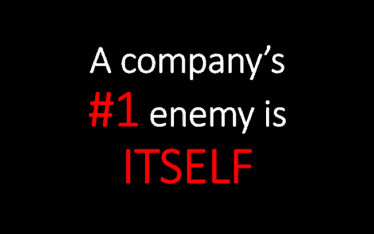Change before the competition force you to change
Some companies take advantage of any change the market brings, while others struggle with the even the smallest internal or market-necessitated modification.
In in an interview with Business Week magazine in 1998, Nokia CEO Jorma Ollila said:
The convergence of Internet to mobile phones will not lead into one single player becoming master of the universe. You’re likely to see the horizontal value chain, like in computers. You’ve got to find your place in the value chain. Our special edge will be in voice and data terminals, where the radio link is a crucial element. Voice terminals, to a major degree, will be wireless. That will mean that our weight in the industry will grow.
And in March 2001 when speaking at Stanford School of Business, Ollila said:
The key challenge of technology companies today is how we renew ourselves. The technological cycles are shorter. We must build on our discontinuities and turn them into our favor … 3G handsets will be affected by the number of types of software embedded in the devices. The way in which software is changing what used to be a simple product will change the industry significantly.”
Just as it took Nokia six years to become the largest and most influential mobile player in the world. It has taken Apple and Google about four years to become the most influential forces in the world of mobile. One can only imagine where those two will be in six years.
Four years ago it was the undisputed king of cell phones. Now its share of the smartphone market has plummeted from 49 percent, prior to the 2007 introduction of the iPhone, to 25 percent in the first quarter of 2011, according to Gartner Group.
Mr. Ollila would be forgiven for thinking “if only they had listened”. In the famous burning platform memo by current Nokia CEO Stephen Elop, Mr. Elop bemoaned Nokia’s inability to turn products around.
So what went wrong for Nokia: Pride, complacency, timing, mismanagement – or a combination? Maybe some of the statements from CEO Stephen Elop can throw a light on the causes:
We have some brilliant sources of innovation inside Nokia, but we are not bringing it to market fast enough.
That upsets me-not because some of you are using iPhones, but because only a small number of people are using iPhones. I’d rather people have the intellectual curiosity to understand what we’re up against.
I believe at least some of it has been due to our attitude inside Nokia. We poured gasoline on our own burning platform. I believe we have lacked accountability and leadership to align and direct the company through these disruptive times. We had a series of misses. We haven’t been delivering innovation fast enough. We’re not collaborating internally.
At the lower-end price range, Chinese OEMs are cranking out a device much faster than, as one Nokia employee said only partially in jest, “the time that it takes us to polish a PowerPoint presentation.” They are fast, they are cheap, and they are challenging us.
While competitors poured flames on our market share, what happened at Nokia? We fell behind, we missed big trends, and we lost time. At that time, we thought we were making the right decisions; but, with the benefit of hindsight, we now find ourselves years behind.
Companies most likely to be successful in making change work to their advantage are the ones that no longer view change as a discrete event to be managed, but as a constant opportunity to evolve the business.
So is change readiness is the new change management? Change readiness is the ability to continuously initiate and respond to change in ways that create advantage, minimize risk, and sustain performance.
Short URL & title:
Change before the competition force you to change — http://www.torbenrick.eu/t/r/mwl
Share it:
If you enjoyed this article, please take 5 seconds to share it on your social network. Thanks!








That’s the proof that are no longer the big ones that eat the small ones, but the faster ones eat the slow ones and most of the times the slow ones are real big.
Among the most outstanding blogposts I’ve come across in a very long time